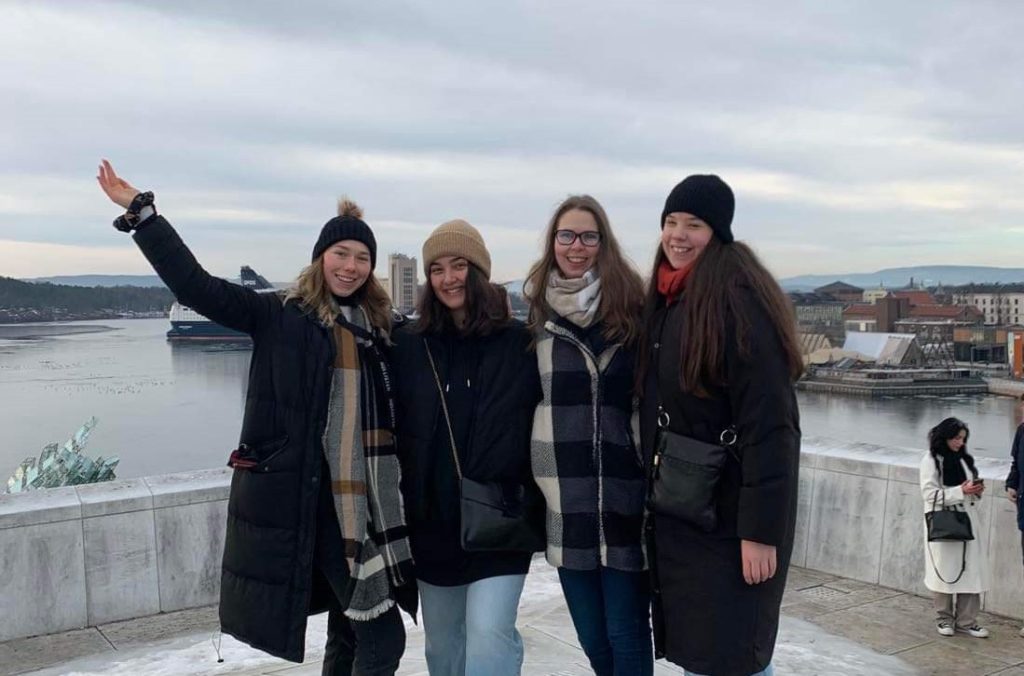Corvinus students win an award for IT-based business model innovation in Oslo

On behalf of Corvinus University four undergraduate students, Anett Aszódi, Mirella Fekete, Anna Kálmán and Csilla Szalay, participated in this year’s BI International Case Competition. Team members were selected from students who successfully completed the Cases on International Business Strategy (CIBS) course. Preparations for the competition were supervised by Zsolt Matyusz, Associate Professor of the Institute of Operations and Decision Sciences.
During the week-long competition, 12 international teams from all over the world competed against each other. The teams were required to solve and present two real-life business cases before a professional jury including representatives of the case companies.
The first case was delivered by Mesta, a Norwegian government-owned company providing infrastructure construction services. The problem requiring a solution was that the company operates with varying degrees of profitability in different regions of Norway. The contestants had 12 hours to present an analytical framework to help analyse and identify the reasons behind the poorer performances of the regions.
“The first case was a learning case, so everyone could watch the presentations delivered in their own division, which was very useful. It was very interesting to observe the problem-solving styles of the different countries. It was an amazing new experience to meet so many talented students and watch them present their cases,” said Anna Kálmán.
After that, the teams were given 30 hours to solve the second case. During this time, the teams worked on a problem from a company called CodeIT. CodeIT’s engineers developed a solution to help manufacturers take traceability and automation of their operations to a new level, but their current operations have failed to provide enough return for sustainable global growth. To address the issue, they asked the competitors to develop a business model and transition plan based on recurring annual revenues.
For a team to be able to provide a solution for such a complex issue in 30 hours that is also assessed by a professional jury, it requires profound knowledge and a well-developed case-solving structure. “An international competition does not just start abroad; it starts at home, as the preparation requires a lot of learning, practise, and dedication, which pays off in the end. This is exactly why I will always be grateful to my teammates for their commitment and strive for perfection, and to our teachers who guided and supported our preparations and who were just as excited about the outcome as we were at the end,” said Mirella Fekete.
Our students came second in their division behind the winning team from the American University of Beirut. It is a unique opportunity for undergraduate students to be able to present in front of a professional jury in an international setting. The quality of the team’s work was marked by the fact that after presenting both cases, a member of the jury approached the team to congratulate them on the solution delivered to a corporate problem.
“I have always felt the importance of helping business executives solve their problems during my time at university, but it is a completely different experience when a member of the jury specifically seeks out the team after the presentation to congratulate them and discuss their proposals. We are all the more proud that we have been able to surprise and impress some well-known practitioners,” said Csilla Szalay.
In addition to gaining professional experience, the competition gave our students the opportunity to explore Oslo together with the other teams. They visited Oslo City Hall where the Nobel Peace Prize is awarded every year and The Viking Planet museum for a glimpse into Viking history and culture. This was also an excellent opportunity for the teams to get to know each other.
“For me, one of the best parts of the competition is the chance to meet new people and make friends because relational capital and networking are more important than anything else in the business world,” said Mirella Fekete.
As undergraduate students, the team members completed the Case Track course during which they acquired the necessary knowledge for solving business cases.
“Thanks to the Case Track course we have gained skills that enabled us to compete on the international stage. The variety of business skills and post-presentation support we received during the course helped us to represent our university in Norway,” said Anett Aszódi.
“I am really grateful for the opportunity to participate in such a prestigious international competition, thanks to the skills and knowledge we gained in the Case Track course,” Anna Kálmán added.
Congratulations to the team and their mentor, and thank you to all the other teachers and former contestants who helped with the preparations!